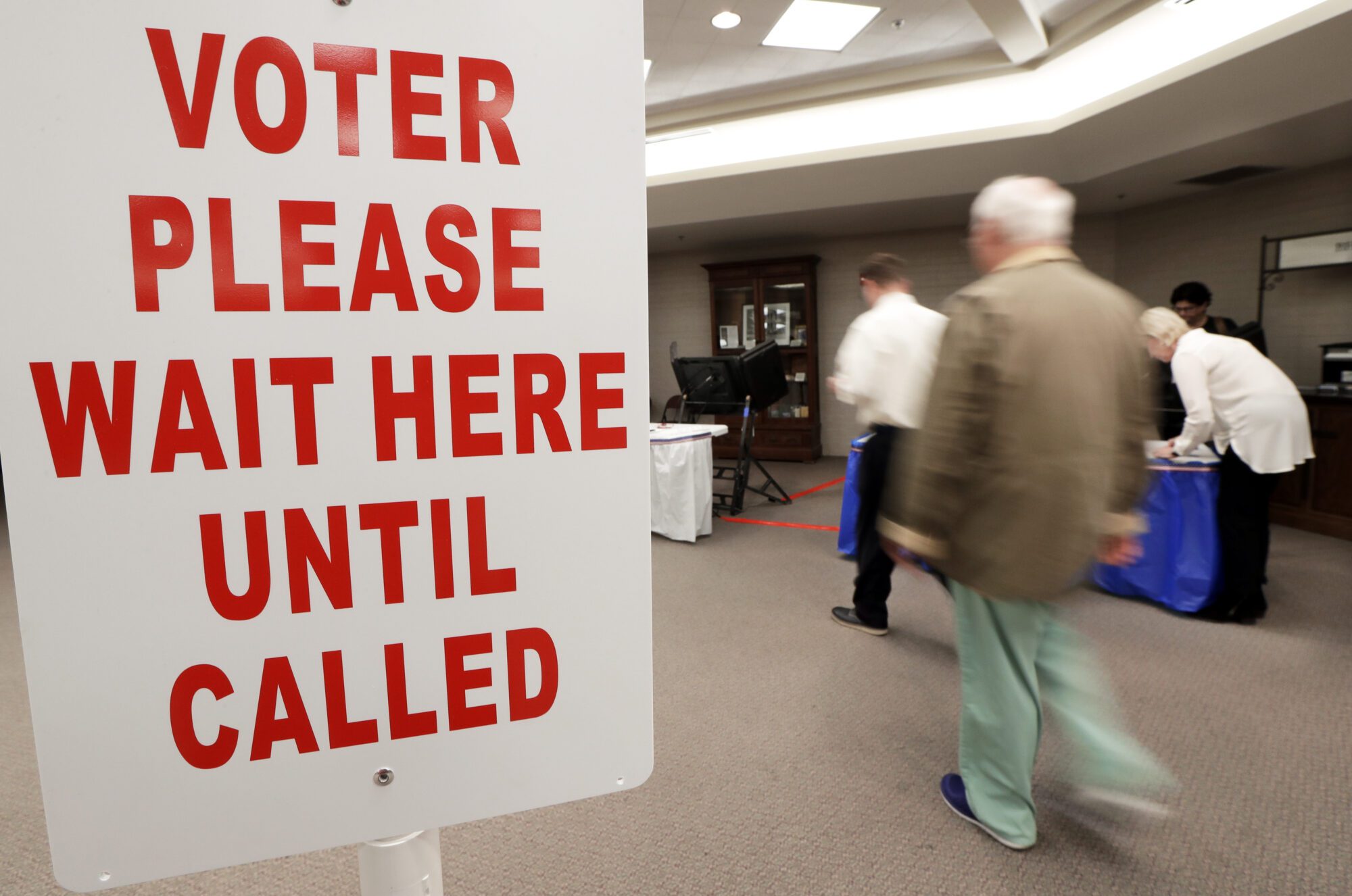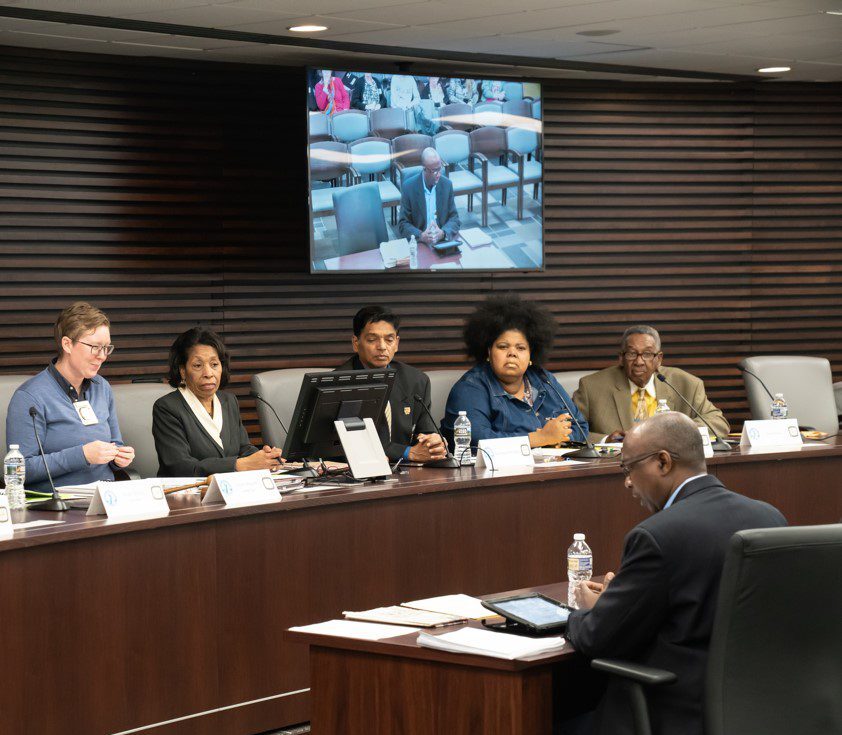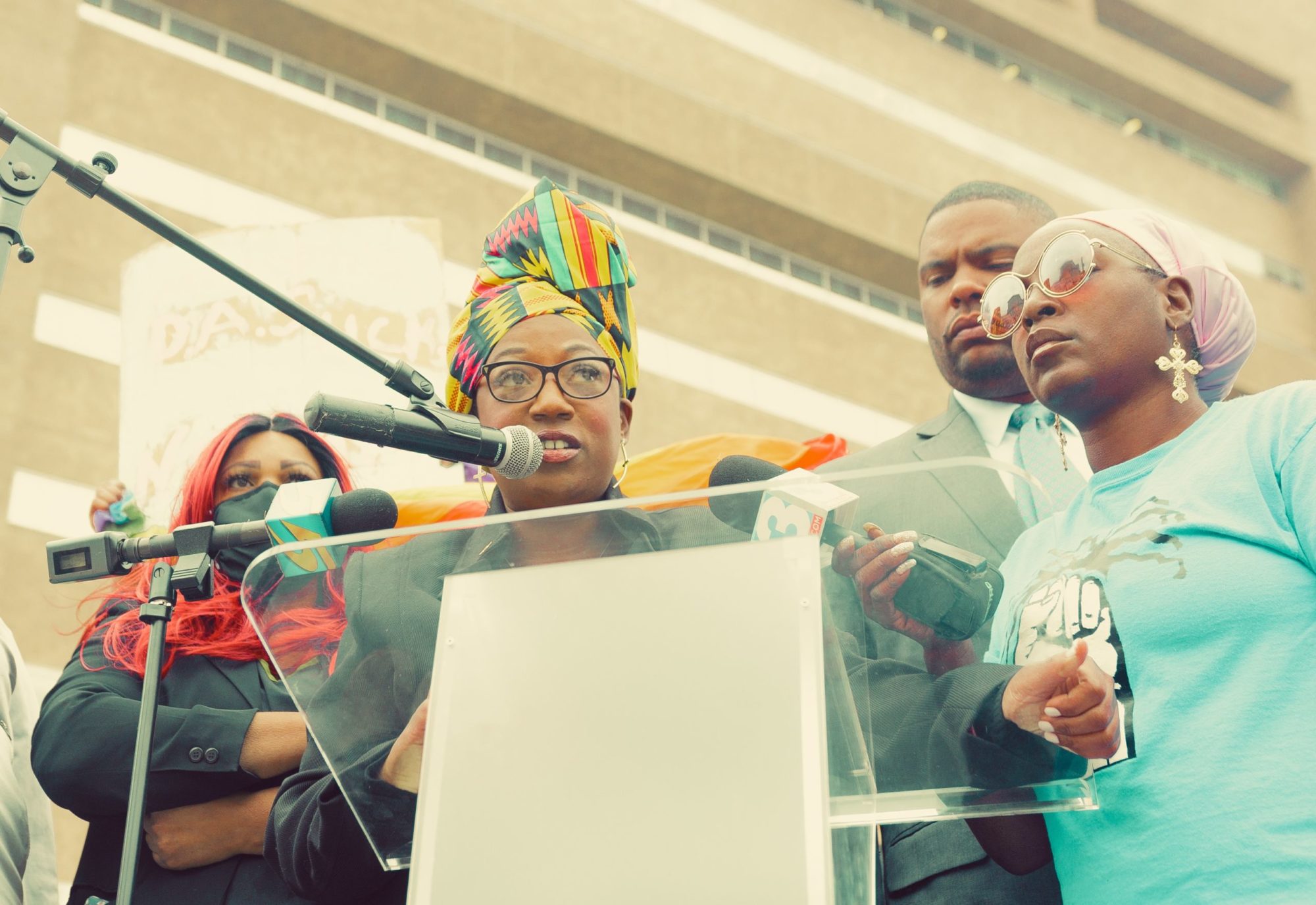Tennessee Puts Voting Rights at the Whims of State Officials
The state made an infamously difficult process of restoring voting rights for people leaving prison even harder, now requiring that they plead for approval from a governor or judge.
Daniel Nichanian | August 8, 2023


Michael Moore has spent two years trying to regain the right to vote. He has worked to meet Tennessee’s byzantine list of criteria for having voting rights restored and filed extensive paperwork only to be denied because he still owes thousands of dollars in court obligations, more than he can afford.
Then late last month, Tennessee’s elections director effectively shut down the process for restoring voting rights to Moore and hundreds of thousands of others in the state stripped of voting rights due to past felony convictions.
In a July 21 memo, Tennessee Coordinator of Elections Mark Goins, a former Republican lawmaker, told local election offices that, on top of showing they’ve checked off all the boxes listed in state law, formerly incarcerated people must now also complete a separate process: persuade the governor to issue a pardon, or a local judge to issue an order restoring their rights. These officials can reject a request at their sole discretion, regardless of the criteria a petitioner has met.
It costs $159.50 to ask a judge for such an order in Davidson County, home to Nashville, where Moore resides, adding another financial hurdle to what was already a nearly impassable process.
Moore says he remains determined to work his way through the new process. “I feel like it’d make me a whole citizen again, getting my voting rights,” he told Bolts. Still, he says it felt particularly painful to pass by people at the polls during last week’s mayoral election in Nashville, knowing the state had just made it harder for him to ever again participate. “I’m hurt looking at the people voting, and I wish I could make a local difference in my community,” he said.
“They’re making it near impossible,” he added. “I think it’s by design. Once they open a door, they put out another block.”
Moore is working with Free Hearts, an organization led by formerly incarcerated women that helps Tennesseans regain the right to vote. Dawn Harrington, its executive director, told Bolts that dozens of people have already contacted Free Hearts asking for help since the new rules have put their rights entirely up to the whims of state officials. “What the state of Tennessee is doing is trying to suppress the vote, and be very strategic in suppressing the vote,” says Harrington, who herself had her rights restored in 2020.
Tennessee’s previous system for restoring voting rights after prison, established in 2006, required people to file a certificate with their local elections office demonstrating that they fulfilled a long list of requirements, which included finishing all parts of a sentence, including probation and parole, paying off any fines, fees, and child support, and getting a corrections officer to sign off. Nearly 500,000 people in Tennessee are disenfranchised—around 9 percent of the state’s adult population.
With Tennessee’s criminal legal system beset by massive racial inequalities in policing and prosecution, felony disenfranchisement is even higher for Black adults in the state: 21 percent can’t vote because of prior convictions, the highest rate in the nation.
Advocates for rights restoration stress that these staggering numbers illustrate how tremendously difficult the previous system already was to navigate. According to the Sentencing Project, only 2,034 were able to get their rights restored between January 2020 and September 2022.
“Even under the old procedure, less than one percent of people who had felonies were able to get their voting rights restored because of just a morass of bureaucracy,” says Kathy Sinback, executive director of the ACLU of Tennessee. “What Mark Goins has done is horrifying, but [getting your rights restored] was almost impossible already.” Sinback told Bolts the hurdles the election coordinator added to the process last month are “putting in clearer relief the magnitude of the problem.”
“It puts the final nail in the coffin of democracy,” she said.
With this change, Tennessee joins Mississippi and Virginia as the only states where anyone who loses the right to vote over a felony conviction is presumed to lose it for life; in those states, the only path for relief is an act of clemency that is entirely at the discretion of state officials. (Nine other states permanently disenfranchise some but not all people with felony convictions.) Virginia only joined this group this year due to a new executive policy announced by Governor Glenn Youngkin, a Republican.
Mississippi’s statute was struck down on Friday by a federal court. The state has not yet indicated whether it will appeal the decision.
The changes move Tennessee’s policy on rights restoration backwards in time. Before 2006, the state required people to secure a pardon or a court order to regain their voting rights, based on the process laid out in a 1981 statute. Then the state adopted the law in 2006, sponsored by two Democratic lawmakers, that meant to make the process less discretionary and listed specific requirements people must meet to be reinstated on voter rolls—the certificate process, detailed above. For the last 17 years, people who wanted to restore their rights needed to navigate cumbersome paperwork and bureaucracy to prove they met the criteria, but they didn’t need an individual court order or action from the governor.


Even with the 2006 reforms, the state maintained harsh standards for who is even eligible to have their rights restored, for instance disqualifying many lower-income people who could not afford to pay off their court debt or who fell behind on child support payments while incarcerated.
And not all Tennesseans were eligible to have their rights restored depending on the specific conviction they received. The process for determining eligibility was so confusing that people needed a three-page flow chart to decipher it.
In practice, many people who were eligible did not bother jumping through the hoops. Bolts talked to numerous Tennesseans who explained that it took them a very long time to access basic information and find people willing to help them understand the state’s process. They say they encountered elections officials who were also unable to answer basic questions, and had to chase down correctional officers to get them to sign the certificate many were unfamiliar with. After Harrington’s release from prison in 2011, for instance, it took her legal assistance and years of efforts—she was convicted in New York so had to get paperwork filed in that state—to fulfill the steps and regain her voting rights in 2020.
“The agencies that oversee the officials that are supposed to issue the certificate never created any training, any guidance,” Blair Bowie, an attorney with the Campaign Legal Center, which sued the state over these rules, told Bolts. “The whole system is scattershot.”
Errors also put people who tried to regain their rights at risk of potential criminal prosecution. The state drew national furor last year when Pamela Moses, a Black activist in Memphis, was sentenced to six years in prison for registering to vote when she was not eligible to. A judge vacated her conviction after The Guardian reported that she had received false advice from state officials, and months later, voters ousted the local prosecutor who had targeted her.
Last month’s memo from Goins, Tennessee’s elections director, made the rules more complex by piling the 1981 and 2006 statutes on top of each other. It states that people must obtain a pardon or judicial approval as outlined under the 1981 law and follow the certification process laid out by the 2006 law, saying the latter didn’t replace the requirements in the former.
Goins, who did not respond to a request for an interview, has attributed the policy change to a decision issued by the Tennessee Supreme Court in June in a case brought by Ernest Falls, a man with an out-of-state conviction who argued that he should not have to abide by all the requirements laid out in the 2006 law since he had already regained his voting rights in Virginia before moving to Tennessee.
In ruling against Falls in late June, the court decided that the requirements of the 1981 and 2006 statutes should be combined when it comes to people with out-of-state convictions. Goins’ memo the next month stated that elections officials are now extending the logic of that ruling to people who have been convicted in Tennessee. The memo included a new version of the certificate of restoration, and instructions to also apply for a pardon or court order restoring rights of citizenship. “The application of the holding to other governing statutes requires the same interpretation to those convicted of a felony in both federal and Tennessee state courts,” Goins said.
Bowie, whose organization helped bring the lawsuit on Falls’ behalf, told Bolts that these instructions are a “total misreading of the law.” She says it’s ludicrous to claim that lawmakers intended for the 2006 reforms to make the process even more burdensome.
Steve Cohen, the lead sponsor of the 2006 law in the state Senate, told The Tennessee Lookout that this was “absolutely not” what his reform was meant to do. Cohen, who now serves in the U.S. Congress, did not answer a request for comment on the drafting of the 2006 law.


Demetrus Coonrod, a city councilor in Chattanooga who was incarcerated in the 2000s, got her voting rights restored a decade ago through the post-2006 system that only required completing a certificate. But she went on to also petition a court to restore her full rights of citizenship because she also wanted to run for office. She succeeded, one of only 11 people to complete that process in Chattanooga over a three year period. But she knows firsthand how arbitrary those decisions are.
“I was concerned because it felt like a gamble,” Coonrod told Bolts. “A judge can determine his idea of what a person is supposed to do to be productive.”
People will now be subjected to that same procedure just to regain their voting rights, and Coonrod warns that making people plead for a governor or judge’s forgiveness will make the voting rights process even more haphazard.
Harrington, whose group helps guide people through the rights restoration process, also warns that the legal fee people must pay to petition the court for such an order will add a tremendous obstacle for the state’s poorer residents to even apply.
“How are you going to charge somebody to restore their right to vote?” Harrington said.
Dismayed by the new reality, Tennessee advocates want state lawmakers to step in and pass a system for automatically restoring people’s voting rights. Until then, they are also calling on Republican Governor Bill Lee to issue a blanket executive order to grant people pardons.
Iowa Governor Kim Reynolds, who is also a Republican, issued such an order in 2020 when she restored the voting rights of Iowans once they complete most felony convictions.
“When someone serves their sentence and pays the price our justice system has set for their crimes, they should have their right to vote restored automatically,” Reynolds said at the time.
Since regaining her own voting rights, Conrood says she has devoted herself to helping others in Chattanooga go through the rights restoration process, step by step, “just keeping them empowered enough to complete it.” She shows people her own certificate of restoration to help fight off discouragement. “The hardest part for them was actually believing that it could happen for them too,” she said.
This year, Coonrood helped Nate Shropshire, a Chattanooga resident who had first looked into how to regain his voting rights a few years ago. He finally completed his paperwork and registered to vote this spring—right in time to beat Goins’ memo and avoid its new hurdles, such as the need to pay the court system and get lucky with a magnanimous judge.
Shropshire says he is now eager to exercise his voting rights but also to continue rebuilding his life.
“I just want to be a normal citizen like everybody else and not let my past determine my future,” he said.
Sign up and stay up-to-date
Support us
Bolts is a non-profit newsroom that relies on donations, and it takes resources to produce this work. If you appreciate our value, become a monthly donor or make a contribution.




